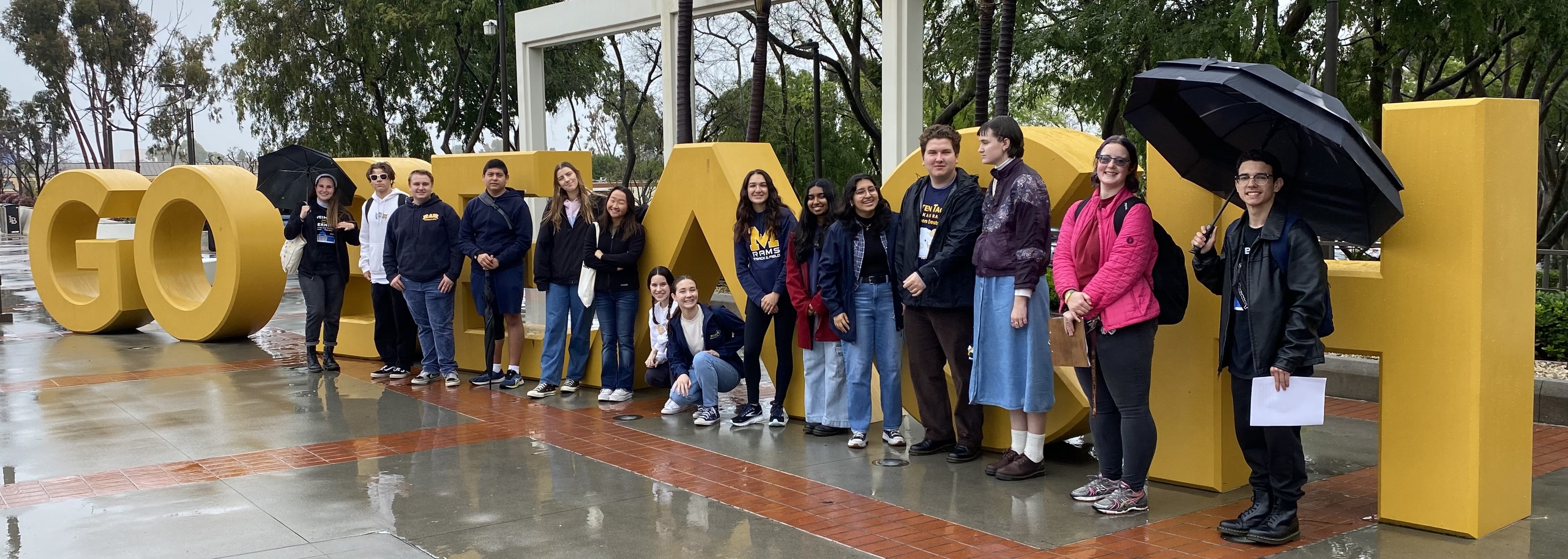German

Willkommen!
Learn German at CSULB! Did you know you can learn German at Cal State Long Beach? You sure can! The RGRLL Department offers a wide range of German courses: from 101A for absolute beginners all the way through graduate seminars. We can help you meet your goals regardless of why you want to learn German. Study German @ The Beach. Wir wollen helfen.
- SMALL CLASS SIZES. Classes in German average fewer than 20 students per class.
- PERSONALIZED ATTENTION. You’ll get to know every faculty member and student in the department. We’re big enough for a wide range of interests, but small enough to form a real community. We want to help you.
- EASILY DOUBLE-MAJOR OR MINOR. German pairs perfectly as a double major or minor to dozens of other academic programs at CSULB: Film and Electronic Arts, Linguistics, International Studies, Art History, Political Science, History, Philosophy, Music, Business, Journalism, Economics, other languages, and on and on.
- GERMAN IS USEFUL. For a lot of fields, jobs, places, and hobbies. You can use it to read historical documents. It could help you get a job at German companies such as BMW, Mercedes, Porsche, Volkswagen, Lufthansa, Siemens, Hamburg Süd, Bayer, etc. In addition to being useful for travel in Germany and Austria, it tends to be useful in unexpected places as well; you could find yourself speaking German in Croatia, Poland, or, well, Los Angeles. You can use it to finally understand Rammstein lyrics in the original language; those songs might not be about what you think they’re about. German will let you get more out of Bach too. You might not believe us until you spend some time with the texts in the original language, but German literature can be mind-blowing. Many German movies are better than you think too. Oh, and you might be interested in reading thinkers such as Marx, Nietzsche, and Freud in their own languages as well. There’s so much that you could do with German that it would be impossible to list it all here.
- STUDY ABROAD. We offer a variety of opportunities for study abroad in Germany and Austria as well as other immersive experiences. Plus, we have lots of scholarship funds designated for students in our program to study abroad. We want you to have immersive experiences in German, and we want to help make that happen for you. (For more information, see the separate Study Abroad section of our website.)
- SOUTHERN CALIFORNIA. Long Beach is an energetic, urban environment directly on the Pacific Ocean. There’s a beach, and it’s long. But Southern California is also home to a wealth of German cultural and historical sites. Bertolt Brecht was in exile in Southern California during the Second World War. So were Thomas Mann, Fritz Lang, Theodor Adorno, Arnold Schoenberg, and many others. Brecht wrote poems about Southern California. Christa Wolf spent the 1992-1993 academic year in Southern California and in 2010 published a novel that takes place here—Stadt der Engel oder The Overcoat of Dr. Freud. Southern California also has the German Currents Film Festival, the Villa Aurora, the Thomas Mann House, a Goethe Institut, several German Saturday schools, several German markets, some German restaurants, a few Oktoberfest venues, and frequent screenings of German films. The German faculty here have written about such German-Angeleno connections and are excited to talk about them. Southern California indeed offers a unique playground for German Studies.
Requirements for the MA in German
- Completion of a minimum of 30 units of approved graduate-level and upper-division courses, including at least 24 units in German and at least 18 units in 500- and 600-level courses in German
- Reading knowledge in an additional language (in addition to German and English) that can justifiably support your scholarly endeavors
- A culminating activity: either a series of comprehensive examinations or a thesis (consult with the Graduate Advisor for more information about these options)
What are our former MA students doing now
- Some our former MA students have gone on to PhD programs including at Harvard, Johns Hopkins, UC-Berkeley, UC-Davis, Univ. of Cincinnati, Univ. of Minnesota, Univ. of Washington, Vanderbilt, and Washington University in St. Louis. A few of those students are now university professors.
- Some of our former MA students are now German teachers, including at high schools, community colleges, and Saturday schools.
- Some of our former MA students now work for German organizations and companies, including the Goethe Institute, the German Embassy, the Villa Aurora, and Mercedes Benz.
- The lists above are typical categories. But don’t feel limited by that. In some of the most interesting cases, students blaze their own trails. We’re here to mentor you along the way, not to force you into set tracks.
Funding
- A limited number of Teaching Associateships are available for qualified students in the German MA Program. New applicants for Teaching Associateships must have been accepted into the Program and must present a letter of application, a resume, a complete set of transcripts, and arrange for three confidential letters of recommendation to be sent to the Graduate Coordinator. Teaching Associates are required to enroll in RGR 524 (Second Language Acquisition) in the fall semester. Teaching Associates are normally assigned only one class to teach and receive training and supervision.
- Students are encouraged to apply for financial assistance via FAFSA and under the Federal Work-Study Program.
- Scholarships are available on a competitive basis for students to study at a German-speaking university.
- There may be other funding opportunities that are seasonal and competitive. Consult with the graduate advisor about other opportunities.
How to Apply PDF
A degree in German emphasizes competency in the use of language and a thorough understanding of important aspects of contemporary society in German speaking countries (literature, political life, film, social issues). At the heart of the European unification process and serving as the new bridge towards Central and Eastern Europe, Germany, Austria, and Switzerland play a pivotal international role in politics, in trade and in cultural exchanges.
A wide range of options are available for CSULB students to study in Germany and Austria as well as in immersive German-language programs in the United States. We want you to have such experiences.
Below are some standout German-language options. This list of programs is nowhere near exhaustive. It represents merely a few highlighted options:
For Additional Information:
- Consult with German Program Director: Robert.Blankenship@csulb.edu
- Visit the Study Abroad Website
- Visit the study abroad office: Foundation Building Suite 185B







